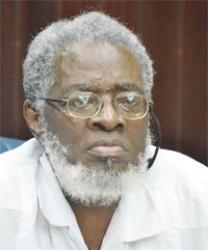Head of the Presidential Secretariat Dr. Roger Luncheon says that the continuation of a USAID-funded $300 million democracy project here is an “affront” to Guyana’s sovereignty and the issue is engaging the highest levels of government.
“The issue is, the Cabinet of this nation, a sovereign country, indicated to the American Ambassador its definitive position on this matter, and according to the reports in the Stabroek News of the 19th of December, the (US) Ambassador in an article, has essentially said, I am going ahead with what I want to go ahead with,

and this decision of Cabinet, disapproving this project, I will ignore, I will disregard, indeed he has effectively challenged state power,” the Government Information Agency (GINA) quoted Luncheon as saying during an interview on the National Communications Network’s Political Scope programme.
GINA reported that Minister of Foreign Affairs Carolyn Rodrigues-Birkett has been mandated by Cabinet to ascertain if indeed the statements attributed to the US Ambassador were made by him. “We want the US Ambassador to confirm that what was read, that what was said, attributed to him is indeed accurately done by the reporter from Stabroek News. One can hardly expect the Ambassador at this stage of the game to disassociate himself from the remarks attributed to him, but for the record, we need a written submission where the Ambassador acknowledges the statements reported in the Stabroek News are indeed accurately reflective of the positions that he adumbrated, that it is a factual and accurate report,” Luncheon was quoted as saying.
Once this information is provided, government will “sit with the Americans and discuss this challenge, this flouting of state authority and this challenge to the exercise of authority by the Cabinet,” the HPS said.
On November 26, Luncheon announced that government had rejected the $300 million Leader-ship and Democracy (LEAD) project which, among other goals, aims to boost citizens’ engagement with local parliamentarians and improve overall governance.

The Donald Ramotar administration later claimed that it had no input but last week, US Ambassador Brent Hardt, in an exclusive interview with Stabroek News, said that government’s claim was “completely false” and the US embassy released a series of correspondence showing that from the start the administration was actively engaged on the project. Luncheon had even thanked them for their “diligent” efforts to inform government. The embassy also announced that the LEAD project will continue with or without government’s participation.
Following the publication of the article in the Stabroek News, GINA reported that Luncheon sharply criticised the decision to implement the project or aspects of it, despite strong objections by the Cabinet. He said that the issue was engaging the highest levels of government in no uncertain terms.
Affront
“This issue is an affront to Guyana’s sovereignty,” Luncheon, said according to GINA. “It is essentially a challenge by the US Ambassador in one, acknowledging that he, they, have ignored Cabinet’s disapproval, and are implementing elements of this project, not in any guise of having a discourse on the matter, but just to inform the government through the media of what position has been adopted by the American authorities. That is what at this point occupies the minds of the Presidency and Cabinet.”
GINA reported that Luncheon said that the US Ambassador’s resort to the media, in this case the Stabroek News to declare their intentions of pursing the project despite government’s position, borders on the “grossest disrespect and abuse of his diplomatic presence.” He said that all other “antecedent events” about the project can now be considered moot, the report said.
According to Luncheon, the view by some sections of society that the governance project should be entertained and even implemented due to its perceived importance is not the main issue. The opposition parties have been critical of government’s decision to reject the project. “It is not about the project and the US$1.5 million that we’re going to lose, it is not that. Cabinet made a decision, a definitive decision that is where the matter ought to have ended,” Luncheon was quoted as saying.
GINA reported that the USAID project was not approved by Cabinet and this was formally indicated to the relevant authorities on October 26. Uncon-firmed reports later indicated that the USAID project activities were being implemented and Cabinet wrote to the US Ambassador, requesting clarity on the matter, GINA said. It reported that on December 19, a meeting was convened among President Donald Ramotar, Luncheon and Ambas-sador Hardt. “The Ambassador was not categorical in affirming to the President and myself that yes, indeed, I have received confirmation of Cabinet’s disapproval, notwithstanding which the American authorities have indeed continued to implement elements of the project. He was not definite in making those two assertions,” Luncheon was quoted as saying.
Government and Guyana has benefitted from what has been described as a healthy engagement between the US through its USAID programme, Luncheon said. However, he said the actions concerning this specific project are “baffling and perplexing”, noting that the apparent move by the US’ top diplomat here, to challenge the authority of the state and to exert his powers in Guyana, need to be understood, GINA reported.
Disturb
The issue of why this specific project is being used to confront the Guyana Government and disturb the healthy relationships that have evolved over time between the two governments is one that needs to be addressed, Dr. Luncheon said, according to GINA.
The US democracy project covers a wide scope of activities from boosting citizens’ engagement with local parliamentarians and education on recently-passed local government reform legislation to assistance for parliamentarians in legislative research and drafting of laws. The project is being implemented by the International Republican Institute (IRI) and emphasizes consultations with all stakeholders.
The project, which seeks to support Guyanese stakeholder efforts to promote effective and responsive democratic institutions in Guyana, will strengthen political and consensus-building processes and skills through four programme components. These are: Strengthen political stakeholders to engage in consensus-building in the National Assembly and more effectively interact with citizens to address key issues; Strengthen the National Assembly and boost citizen engagement; Motivate and better equip Guyanese youth to constructively engage in political and civic processes; and Civic and voter education on the implementation of local government reform and local elections.








